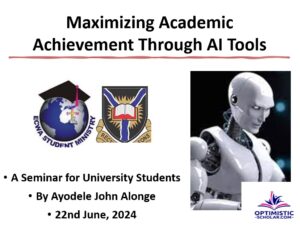You can also SUBSCRIBE to our Newsletter Here
Maximising Academic Achievement Using AI Tools: Insights from Dr. Ayodele John Alonge
In today’s fast-changing educational scene, artificial intelligence (AI) transforms how we approach learning and teaching. Dr. Ayodele John Alonge, a lecturer and researcher at the University of Ibadan and the principal content developer of the OptimisticScholar blog, discusses how AI tools could enhance academic performance in an upcoming talk. This lecture, delivered online at the ECWA Student Ministry Academic Summit on June 22, 2024, at the University of Ibadan in Nigeria, provides critical insights and practical uses of artificial intelligence in education. The article explores Dr. Alonge’s thorough guidance on using AI to improve educational outcomes.

An Overview of AI in Education
Artificial intelligence has become an essential component of modern education, providing creative solutions that go beyond traditional teaching approaches. Artificial intelligence tools are designed to:
-Personalise Learning Experiences: AI personalises instructional content to fit each student’s specific needs, ensuring the appropriate amount of challenge and support.
– **Streamline Administrative processes:** Automating processes like grading and scheduling allows educators to focus on teaching and student interaction.
– **Offer Intelligent Tutoring Systems:** AI-powered tutors provide real-time feedback and support to help students learn complicated ideas and develop their skills.
Key Artificial Intelligence Tools for Students
Dr. Alonge presents various AI tools that have a substantial impact on teaching.
- Intelligent Tutoring Systems (ITS): These systems use artificial intelligence (AI) to give personalised teaching that adapts to the student’s learning style and speed. Examples include Carnegie Learning and DreamBox.
- AI-Enhanced Learning Management Systems (LMS): Platforms such as Canvas and Blackboard use AI to provide personalised learning paths and predictive analytics that help identify students who are at danger of falling behind.
- Natural Language Processing (NLP) Tools: AI-powered tools like Grammarly and WriteLab improve writing skills by delivering real-time grammar and style suggestions.
AI for administrative tasks
Integrating AI in administrative work has various advantages:
- Automated Grading: AI can evaluate multiple-choice tests and even essays, delivering immediate feedback and relieving educators of the time-consuming chore of manual grading.
- Student Performance Analytics: AI systems analyse student data to provide insights into their performance and learning habits, allowing instructors to identify areas where students may want further assistance.
Personalised learning with AI
Personalised learning is one of the most revolutionary effects of AI in education. AI can analyse data from students’ interactions with instructional content.
- Customise Learning Material: Tailor classes to students’ specific needs, making learning more effective and enjoyable.
- Predict Learning Outcomes: Use predictive analytics to forecast students’ future performance and provide interventions that will help them achieve.
Challenges and Ethical Consideration
While AI provides various benefits, there are some problems and ethical considerations to address:
- Data Privacy: Ensuring that student information is protected and utilised appropriately.
- Bias in AI Algorithms: AI systems must be fair and unbiased to prevent reinforcing current educational inequities.
- Edcuacators Training: Educators require training to effectively integrate AI tools into their teaching practices.
Future Trends in AI & Education

Looking ahead, artificial intelligence is projected to continue affecting the future of education in various ways:
- Advanced Adaptive Learning Systems: These systems will grow even more complex, offering highly tailored learning experiences.
- AI in Collaborative Learning: AI will improve student collaboration, both in person and online, by linking learners with complementary talents and knowledge.
- Virtual and Augmented Reality: AI-powered VR and AR will offer immersive learning environments, improving comprehension and recall of complex subjects.
Question and Answer Session Highlights
During the Q&A session, Dr. Alonge answered several crucial questions from the audience.
- Installation in Low-Resource Settings: Dr. Alonge emphasised AI’s ability to bridge educational gaps in low-resource settings through scalable and cost-effective solutions.
- The Teacher’s Role in an AI-Powered Classroom: AI is viewed as a tool to support, not replace, instructors. Educators will continue to play an important role in advising and mentoring students.
Conclusion
Artificial intelligence has the potential to alter education, making it more personalised, efficient, and successful. Dr. Ayodele John Alonge’s views serve as a vital road map for educators, students, and policymakers seeking to harness the power of artificial intelligence in education. By adopting these innovative tools, we can pave the road for a more inclusive educational future.
To learn more about the topic, view the whole video of Dr. Alonge’s address here
...For the latest news update, Subscribe to our WhatsApp Group Chat (Click Here)
You can also SUBSCRIBE to our Newsletter Here
Have any questions, send us a mail via info@optimisticscholar.com or Click Here
Get real time update about this post category directly on your device, subscribe now.

